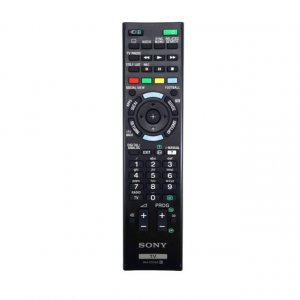I recently bought an Android box to replace my Raspberry Pi 3 player running Xbian.
One of the features I love the most on Raspberry Pi is support for CEC, since I prefer to have only one remote in use. I have controlled Kodi by using my RM-ED060 remote from my Sony Bravia KDL-50W815B that looks like this:
I did some small customization to remote configuration in Kodi on Raspberry pi by hand and I wanted to keep as much of that with my new Android box.
In order to re-map keys I used Kodi add-on called keymap editor which allows you to map almost every key you want.
This is my current gen.xml file that can be found in Android/data/org.xbmc.kodi/files/.kodi/userdata/keymaps/
<keymap>
<global>
<keyboard>
<key id="61670">activatewindow(videos,tvshowtitles)</key>
<key id="61669">activatewindow(pictures)</key>
<key id="61668">activatewindow(music)</key>
<key id="61664">activatewindow(weather)</key>
<key id="61666">info</key>
<key id="61665">contextmenu</key>
<key id="61667">activatewindow(videos,files)</key>
</keyboard>
</global>
<fullscreenvideo>
<keyboard>
<key id="61453">osd</key>
<key id="61667">subtitledelayminus</key>
<key id="61668">subtitledelayplus</key>
<key id="61669">showsubtitles</key>
<key id="61670">activatewindow(subtitlesearch)</key>
<key id="61638">aspectratio</key>
<key id="61453">osd</key>
<key id="61665">info</key>
<key id="61666">codecinfo</key>
</keyboard>
</fullscreenvideo>
</keymap>
If you would like to have the same configuration without doing the re-configuration of the keys yourself, you should copy this file to the same directory.
If you are wondering what are those key id definitions, here are all the codes that I was able to identify with keymap editor for this TV:
61448 - Return/Back
61453 - Select/OK
61488 - 0
61489 - 1
61490 - 2
61491 - 3
61492 - 4
61493 - 5
61494 - 6
61495 - 7
61496 - 8
61497 - 9
61568 - Up
61569 - Down
61628 - Stop
61636 - Rew
61637 - Fwd
61638 - Rec
61664 - Guide
61665 - Options
61666 - Info
61667 - Red
61668 - Green
61669 - Yellow
61670 - Blue
61750 - Left
61751 - Right

